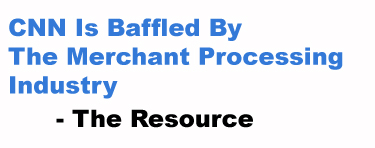CNN Distorts Facts with Merchant Processing Statements
CNN ran an article today (Business Owners Baffled By Financial Statements) that supposedly exposes the crafty credit card industry. While there can always be improvements in transparency, Catherine Clifford not only misses the mark, she speaks authoritatively on a topic that she does not understand. This is upsetting considering she consulted with experts in her research. (Tim Chen, CEO of Nerd Wallet and Phil Hinke, President of MerchantFeeSavers)

Here’s a few errors we’d like to point out:
“Mom and pop stores do not deal directly with credit card giants, such as Visa (V, Fortune 500) and Mastercard (MA, Fortune 500). Instead, they have to work with third-party processors — known as merchant account providers or acquirers.” – Those poor victim Mom and Pop stores! But it’s not just Mom and pop stores that don’t get to work directly with Visa or MasterCard, NO retailer deals with them. Visa and MasterCard operate payment networks, not card processors. It is the role of credit card processors and acquiring banks to deal with retailers, regardless of their size. Catherine, here’s a simple diagram that can better explain it.
“And to make matters worse, every credit card has a different fee structure. Every credit card brand — such as Standard MasterCard, Gold MasterCard, Premium MasterCard, World Elite MasterCard — has its own fee structure. That means there are at least 400 different combinations of charges.” – Only businesses using an Interchange Plus pricing model are billed according to the 400+ cost categories. For those using tiered systems, which is the VAST MAJORITY of mom and pop stores, there are only 3 or 4 rate categories. These categories are extremely easy to understand and compare against competitors using similar pricing. See more on this in our simple guide: Intechange Vs. 3 Tier.
“For example, the bottom of the statement shown above, says: “Effective June 2011, MasterCard is introducing a new fee.” What it doesn’t say is what the fee is for or how much it is.” – MasterCard is a payment network and the fee they charge is roughly 11 basis points. On $100 in sales, that translates to 11 cents, a near immaterial amount. The payment network fee is normally only applied to businesses using the Interchange Plus pricing model. While we believe the omission of the increase is either a mistake or a deliberate alteration to make news, considering how small the fee already is, any increase is likely to go unnoticed.
“We are business owners. We are working. We are taking care of the customers,” said Mike Craighill, who owns two restaurants called Soup and Such in Billings, Mont., with his wife, Antonia. “I don’t have time to spend looking over every single line of the credit card statement.” – We don’t want to slam Soup and Such but their response is particularly ignorant. Just because you can make soup, doesn’t mean you can run a restaurant. Running a business means taking time to go through the financial statements and paperwork. Whether you do it yourself or hire a bookkeeper is your choice, but to complain that you can’t be bothered by looking at a statement once a month is bad business sense. You can’t make the case for transparency while admitting you are too busy serving soup to care anyway.
“That’s why for some business owners, cash only may be the best way to go.” – The worst conclusion ever. To point out that some business owners have trouble understanding their monthly statements and therefore should only use cash speaks volumes about Ms. Clifford, who clearly didn’t care about making a cohesive argument. It’s a shame that millions of people will read the article loaded with errors with the clear endorsement of CNN.
I guess it’s all about spitting out content in the name of web traffic and advertising. It’s articles like this that spring anti-bank lobbying groups into action to fight against something they don’t understand. That’s how we ended up with debit card reform. The whole 21 cent debit cap fee that just went into effect? Hailed as a victory for retailers, it does nothing to change the price of a debit card transaction at the point of sale. Instead it limits how much of the revenue the acquiring bank can split with the issuing bank. Wait, huh?. Yeah… good work.
Next time Catherine, have the expert write the whole article for you or just don’t bother writing it at all.
– deBanked
Last modified: February 21, 2013Sean Murray is the President and Chief Editor of deBanked and the founder of the Broker Fair Conference. Connect with me on LinkedIn or follow me on twitter. You can view all future deBanked events here.































